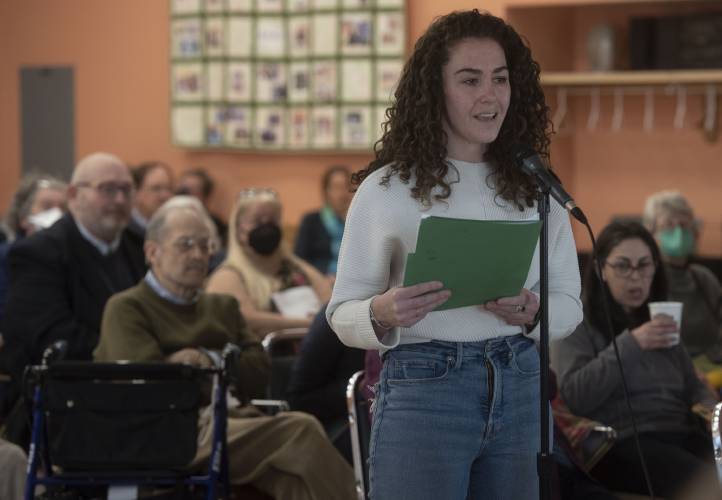
Amherst Town Councilor Ana Devlin Gauthier, who chaired the council subcommittee that prepared the charge for a standing Black Reparations Committee, speaks at the Western Massachusetts Passenger Rail Commission Hearing at the Northampton Senior Center in March 2023.
STAFF FILE PHOTO
AMHERST — A five-member committee that will regularly consult with the Black community in Amherst, making recommendations for how reparations money is disbursed, could soon be established by the Town Council.
The charge for the Amherst Black Reparations Committee was recently approved by the council’s Governance, Organization and Legislation Committee, the last step before the reparations committee is established by the Town Council. That could happen at one of the council’s meetings this monthr.
The idea is to have a committee, whose members would be appointed by Town Manager Paul Bockelman, examine proposals for using up to $100,000 annually to address harms perpetrated against residents of African heritage.
The reparations committee won’t be able to give money directly to individuals without state legislation, but could support creation of a Black, Indigenous and people of color-led youth center with programming that addresses the needs of young people of African descent, providing more affordable housing and homeownership opportunities, and establishing a municipal program to teach entrepreneurship skills.
Among the elements of the charge will be supporting implementation of the recommendations in the African Heritage Reparation Assembly’s 37-page final report, released last October; accepting proposals from the community through a process determined by the body; providing recommendations for action to the Town Council based on priority level and feasibility; consulting with the Black community on a regular basis about the allocation of reparations funds; and working with other town committees and departments to pursue reparative projects where shared goals are present.
The council committee, chaired by District 5 Councilor Ana Devlin Gauthier, removed any role the permanent standing committee has in the financial aspects of reparations, including identifying additional sources of funding for reparative justice work.
The original plan was to have $2 million available over 10 years toward supporting municipal reparations initiatives, such as programs for youth or first-time homebuyers, though town officials have expressed worry that the town cannabis revenues that have been targeted to fund reparations are less than anticipated. Those revenues continue to decline and may not reach the $2 million goal.
Earlier in the summer, Irv Rhodes and Michele Miller, who served on the African Heritage Reparation Assembly, appealed to councilors to the Finance Committee to find other sources of reparations money.
Amilcar Shabazz, who also served on the African Heritage Reparation Assembly, told members of the council committee that the reparations committee shouldn’t be focused on finances, but rather on helping out people.
“It’s to go and deal with the important reparative justice work that the community is sensing, the community is feeling, developing it into something that is precise and actionable and that falls into line with the funds that are available,” Shabazz said.
More News for you
23 Service Center Rd
Northampton, MA 01060
413-584-5000
Social Media
The Newspapers of New England Family
By using this site, you agree with our use of cookies to personalize your experience, measure ads and monitor how our site works to improve it for our users
Copyright © 2023 to 2024 by H.S. Gere & Sons, Inc. All rights reserved.




